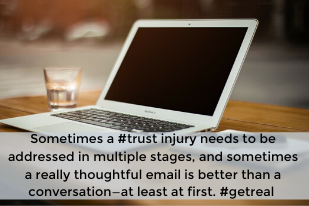This post is part of our Monthly-ish Tips series.

Funny how within a few days of writing my Weekly Tip on rebuilding lost trust I wake up to a very angry email from a client, directed right at me, so I get to practice what I preach. Yay. I learned a few things from applying my own six-part process. And it just so happens a lot of this went down via email, so in sharing I also get to fulfill last week’s promise on how to rebuild lost trust in writing.
It’s also funny—again the ironic kind of funny, not ha-ha funny—that this all went down within a few days of me preaching to a group of senior leaders about the trust-building value of making mistakes, since that’s when your true character is revealed. Yay again.
Short background: I screwed up, and the client’s anger was justified. I didn’t realize I had screwed up when I got the very angry email, and I didn’t mean to screw up, but I did.
Here’s the gist of how my Recovery Mission went down:
- See angry email on iPhone. Feel surge of nausea in pit of stomach. Send quick and immediate email reply from phone basically saying, oh no, I’m surprised and dismayed, and also embarrassed because I’ve clearly erred yet am not sure how. Ask for opportunity to talk through.
- Manage shame spiral. Recognize shame feelings, as eternal “good girl” who has apparently done something wrong. Take deep breaths and set priority to shake off with physical exercise (a strategy of mine for keeping self-orientation low.) While on yoga mat, have big aha and see clearly why client is pissed. Major blind spot revealed. Client right; Andrea wrong. Feel extra embarrassment as trust expert who has been untrustworthy, combined with gratitude for clarity—makes sense now.
- Take notes on what to communicate. Throughout day, amidst other work priorities, jot down phrases and key points to be shared in longer email reply to very angry client. Use “journaling” process to get grounded about what happened, and what should be further communicated.
- Accept client invite for video call to discuss in five days. Include a simple “thank you for making the time” in calendar reply.
- Send “I f***ed up” email. At end of day, send well-considered email basically saying, yep, I see what I did. Consider six-part process for rebuilding lost trust and decide best to focus on first three for now: prove upset has been heard, explore/acknowledge impact, and take responsibility. Include all in email.
- Keep perspective. Remember daily, up until dreaded video call, that no one has died. Decide that if angry client fires me as result of incident, it will totally suck. And it won’t be end of world as we know it—worse things couldhappen.
- Participate in video call. Wait painful seven minutes while client is late due to prior commitment. Acknowledge when call officially begins that past seven minutes dramatically spiked anxiety levels. Breathe sigh of relief when client laughs. Reiterate key points from email and give client space to say whatever else needs to be said. Return to second half of six-part process by suggesting way to make whole/make situation better, and share strategies for making sure incident isn’t repeated. Agree on next steps. End on good note, with acknowledgment from client. Efforts appreciated. Relationship restored.
Phew.
There are a few key lessons in this for me. One is a reminder that the six-part process works. Another is that sometimes a trust injury needs to be addressed in multiple stages, and sometimes a really thoughtful email is better than a conversation—at least at first.
Yet another is to be careful what I write about.
Make It Real
This week, reflect on the strategies you use—or should use—to keep your own self-orientation in check when stuff like this happens.
Learn More

Listen to a six-minute podcast on recovering lost trust, from our friends at Trusted Advisor Associates, or read a story about how listening helps a ton in Chapter 6 of The Trusted Advisor Fieldbook.
Andrea Howe
Latest posts by Andrea Howe (see all)
- A lesson from my own trust “fail” in my first-ever client meeting - April 15, 2024
- Why choosing silence in the face of awkwardness can be a trust tragedy - March 21, 2024
- What NOT to do when you think you’re being ghosted - February 21, 2024
